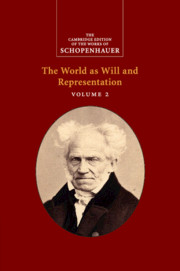Chapter 41 - On Death and its Relation to the Indestructibility of our Essence in Itself
Published online by Cambridge University Press: 30 June 2022
Summary
Death is the truly inspiriting genius or the Musagetes of philosophy, which Socrates accordingly defined as ‘preparation for death’. It would be difficult to philosophize in the absence of death. Thus it is entirely appropriate to grant it special consideration here at the pinnacle of the final, most serious, and most important of our Books.
Animals live without any real conception of death: this is why the individual animal enjoys the permanence of the species directly, since it is conscious of itself only as endless. With human beings and the faculty of reason came the horrifying certainty of death. But throughout nature there is a remedy or at least a compensation for every ailment, and so the same reflection that introduces our cognition of death also procures metaphysical ideas to console us on its account, ideas that animals neither need nor are capable of entertaining. All religions and philosophical systems are directed primarily to this end and are therefore in the first instance the antidote that reflecting reason has produced by its own means to the certainty of death. Still, they achieve this goal to very different degrees, and one religion or philosophy will certainly enable people to look death calmly in the eye much more than the other. Brahmanismand Buddhism will achievemuchmore by teaching people to think of themselves as the primordial being itself, the Brahman, to which all coming to be and passing away is essentially alien, than will those religions that have people coming from nothing and truly beginning an existence received from others at birth. Accordingly, in India we find a confidence and a contempt for death that is different from anything you would find in Europe. It is in fact a dubious business, forcing weak and untenable ideas about this important issue on people by imprinting them early so as to render people permanently insusceptible to more accurate and tenable ones. For instance, to teach people that they have only recently come into being out of nothing, and consequently have been nothing for an eternity and yet will be imperishable in the future, is just like teaching them that, although they are through and through the work of another, nevertheless, they are eternally responsible for everything they do or allow to happen.
- Type
- Chapter
- Information
- Schopenhauer: The World as Will and Representation , pp. 480 - 525Publisher: Cambridge University PressPrint publication year: 2018

